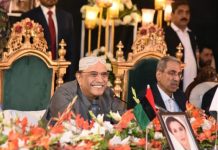DNA
ISLAMABAD: The Supreme Court Monday suspended the Peshawar High Court’s (PHC) verdict on reserved seat while accepting the Sunni Ittehad Council’s (SIC) plea against the high court’s ruling.
The Election Commission of Pakistan (ECP) had rejected the party’s plea depriving it of reserved seats.
“[We are accepting the [SIC’s] pleas [against the PHC verdict], Justice Mansoor Ali Shah stated, and asked under what law [reserved] seats were allocated to other parties.
A three-member bench headed by Justice Shah and comprising Justice Muhammad Ali Mazhar and Justice Athar Minallah heard the SIC’s plea filed through Advocate Faisal Siddiqui last month.
Barring the members, who have taken oath on the reserved seats, from casting their votes in legislation, the SC said that it will hear the case on a daily basis from June 3.
Furthermore, the court noted that the said issue only concerns the additional reserved seats allotted to the political parties later on.
In March, a five-member PHC bench, headed by Chief Justice Ibrahim Khan, and comprising Justice Ishtiaq Ibrahim, Justice Ijaz Anwar, Justice Arshad Ali and Justice Shakeel Ahmad had rejected the SIC’s petition against ECP’s decision depriving it of reserved seats.
The electoral body had ruled that the SIC was not eligible for reserved seats allotted to women and minorities “due to non-curable procedural and legal defects and violations of mandatory provisions of the Constitution”.
While rejecting the plea of SIC, the ECP accepted applications of the opposing parties and decided that the seats in the National Assembly would not remain vacant and be allocated by a proportional representation process of political parties on the basis of seats won by political parties.
In response, the SIC moved the SC court last month urging the apex court to allot the party the 67 women and 11 minority seats in the National and provincial assemblies and set aside the PHC ruling.
The SIC’s plea contends that reserved seats for women and minorities are given to the parties in the national and provincial assemblies on the basis of proportional representation and no party can be given more reserved seats than its representation.
It is to be noted that the issue of reserved seats had been a point of contention between the SIC, which primarily comprises Pakistan Tehreek-e-Insaf-backed independent candidates, and the ruling parties notably Pakistan Muslim League-Nawaz (PML-N), the Pakistan Peoples Party (PPP) and others.
Dozens of members of the PPP, PML-N, Muttahida Qaumi Movement-Pakistan (MQM-P) have taken oath on reserved seats following the PHC’s verdict.
During the hearing today, Justice Shah, while referring to the ECP’s decision to distribute the reserved seats, questioned how political parties can secure seats other than those for which they were eligible with regard to their proportional presence in the assemblies.
“Can the remaining seats be given to them [political parties]? Is there anything related to it provisioned in the law?” the judge questioned.
He further asked: “If there is no such provision in the law, then is it not against the constitutional scheme to do so?”
The judge inquired if the reserved seats can be redistributed in the second phase.
Meanwhile, expressing his views, Justice Minallah inquired about the legality of indirectly ignoring the mandate of a political party and also questioned what is to be done with the remaining reserved seats.

















